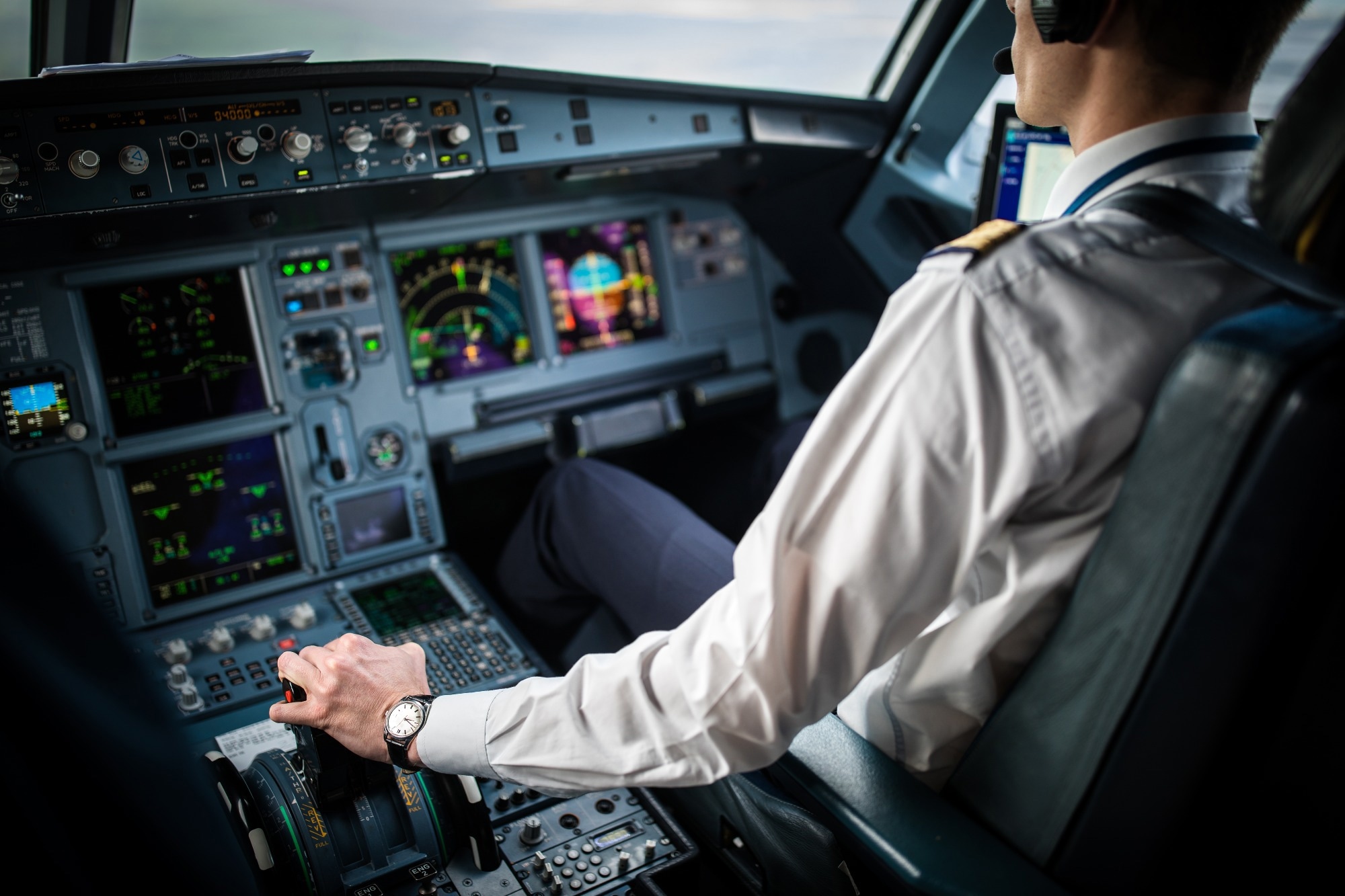A French study reveals high rates of psychological distress and substance misuse in pilots, raising urgent questions about how airlines can protect both crew and passengers.
 Study: Mental health of airline pilots in France: insights from an anonymous online survey. Image credit: l i g h t p o e t/Shutterstock.com
Study: Mental health of airline pilots in France: insights from an anonymous online survey. Image credit: l i g h t p o e t/Shutterstock.com
A recent study published in the journal Frontiers in Public Health aimed to shed light on the mental health of airline pilots. The anonymous online self-questionnaire revealed that about a quarter experienced anxiety symptoms (25.4%), over 13% showed depressive symptoms (13.1%), and more than a third had misused alcohol (40.1%).
The mental health of airline pilots
In March 2015, a Germanwings flight crashed. The cause was determined to be the copilot’s severe depression, which led to suicide. Unfortunately, similar events can be noted in aviation records, which motivates the need to assess the mental health conditions of pilots.
Airline pilots are required to undergo a specialized medical examination every year to detect any somatic and/or psychiatric conditions.
Medical fitness can be suspended in cases of anxiety and depressive disorders, as per the recommendations of the European Aviation Safety Agency (EASA). This could lead to underreporting of psychological symptoms and the use of psychotropic treatments, due to fears of being deemed unfit to fly.
Despite these concerns, research on the mental health of airline pilots is limited, and results are varied. The adverse impact of occupational stress on pilots’ health has been documented, but large-scale data concerning depressive and anxiety disorders in European airline pilots is limited.
About the study
The primary objective was to investigate anxiety and depression scores, measured using the Hospital Anxiety and Depression Scale (HAD-S). The HAD-S has two subscales, namely HAD-A and HAD-D, for measuring anxiety and depressive symptoms, respectively.
The secondary objective was to measure and describe the association of anxiety and depressive disorders with commonly found co-factors, such as socio-demographic and occupational characteristics, alcohol and cannabis use, and health data.
A descriptive cross-sectional study was conducted by emailing an anonymous online self-survey to all National Union of Airline Pilots (SNPL) members between September 1 and October 16, 2022. The SNPL is the main pilot union in France and represents one of the largest national databases concerning pilots. A total of 1,220 filled-in questionnaires were included in the analysis.
Study findings
Out of the 1,220 participating pilots, 93.3% were French, 51.3% held the position of captain, and 90.9% were male. The average age was about 45 years; about 44% operated long-haul flights, and approximately 45% operated medium-haul flights. Nearly 52% of the pilots worked between 40 and 70 hours in the month preceding the administration of the questionnaire.
In the survey sample, 9.6% had a psychiatric history, and 31.8% had at least one medical history. About 8% reported taking pills for insomnia.
Furthermore, a little under 3% experienced suicidal thoughts in the past year, and three pilots reported having attempted suicide. On a scale of 1 to 10, the mean level of fatigue was 5.7.
Approximately 15% of the survey respondents had sought help for psychological reasons in the past year, and 12.5% reported feeling isolated in dealing with their psychological distress.
A total of 310 participants showed an abnormal score on the HAD-A (i.e., HAD-A ≥ 8).
Of those, 14.4% had suspected anxiety disorder, and 11% had confirmed anxiety disorders. For suspected anxiety disorder (HAD-A score between 8 and 10), bivariate analysis showed a significant association with several factors, such as engagement in multi-leg flights, fatigue, , non-reporting of symptoms to AMEs for fear of loss of medical certification, and abnormal HAD-D score.
In multivariate analysis, engagement in multi-sector flights, higher fatigue scores, female gender, feelings of isolation, long-term medication use, non-reporting of symptoms to AMEs, and abnormal HAD-D scores remained significant predictors.
Working more than 40 hours in the preceding month was associated with a reduced risk of confirmed anxiety disorder.
A statistically significant association was noted between classes of HAD-A and marital status, sex, hours worked in the last thirty days, type of company (low-cost or national), presence of financial difficulties, or at least one medical history, and psychiatric history.
Additionally, the HAD-A and HAD-D scores increased similarly in self-reported fatigue scores,
Concerning depressive disorders, 159 pilots showed an abnormal HAD-D (HAD-D ≥ 8) score. Of these, 8.9% had suspected depressive symptoms and 4.2% had confirmed depressive symptoms.
Several factors are significantly associated with HAD-D categories, including working hours, type of company, nationality, medical history, financial difficulties, use of insomnia medication, psychiatric history, alcohol misuse, and feelings of isolation.
Multivariate analysis found that confirmed depressive symptoms were strongly associated with European (non-French) nationality, suicidal thoughts in the past year, financial difficulties, fatigue, and abnormal HAD-A scores. Taking insomnia medication more than twice a week and consulting a doctor for psychological reasons appeared to reduce the risk of confirmed depressive symptoms.
Interestingly, taking insomnia medication more than twice a week and consulting a doctor were found to reduce the risk of depressive symptoms.
For suspected depressive symptoms (HAD-D score between 8 and 10), the significant factors were long-term medication use, nationality, fatigue, financial difficulties, and abnormal HAD-A scores.
Suspected depressive symptoms were less common in unmarried pilots.
Conclusions
The results highlight that a significant proportion of French pilots suffer from psychological symptoms. A concerning finding was that more than a third of pilots exhibited alcohol misuse, which needs prevention efforts to reduce health risks.
This is evidence for the development and implementation of programs for anxiety and/or depressive disorders.
The study also found that 28.3% of pilots chose not to disclose psychological symptoms to aeromedical examiners (AMEs) due to fear of losing their licenses, although 54% would be more willing if this risk were removed.
Future research should aim to further our understanding of this topic by conducting longitudinal studies.
Download your PDF copy now!